Tuesday Poster Session
Category: IBD
P5327 - Causal Effects of Various Particulate Matter/air Pollution on Inflammatory Bowel Disease: Insights From a Systematic Review and Meta-Analysis of Mendelian Randomization Studies
Tuesday, October 28, 2025
10:30 AM - 4:00 PM PDT
Location: Exhibit Hall

Dhvani Tushar Chaudhary, MD (she/her/hers)
GMERS Medical College and Hospital Vadodara
Henderson, NV
Presenting Author(s)
Jay Patel, MBBS1, Dhvani Tushar Chaudhary, MD2, Rupak Desai, MBBS3, Priyatham Gurram, MD4, Sindhura Reddy Dadi, MBBS5, Dhwani J. Shah, MBBS6, Harshavardhan Polamarasetty, MD7, Tanvi Battula, MBBS8, Arunita Thodimela, MBBS9, Aditi P. Wagh, MBBS10
1B.J. Medical College, Ahmedabad, Gujarat, India; 2GMERS Medical College and Hospital Vadodara, Henderson, NV; 3Independent Outcomes Researcher, Atlanta, GA; 4Central Michigan University College of Medicine, Saginaw, MI; 5Mnr medical college and hospital, Sangareddy, Telangana, India; 6Grant Government Medical College, Mumbai, Maharashtra, India; 7Harlingen Medical Center, Houston, TX; 8Gandhi Medical College & Hospital, Hyderabad, Telangana, India; 9Government Medical College Nizamabad, South Plainfield, NJ; 10Fox Chase Cancer Centre, Philadelphia, Philadelphia, PA
Introduction: The incidence of inflammatory bowel disease (IBD), encompassing Crohn’s disease (CD) and Ulcerative colitis (UC), continues to rise globally, affecting up to 2.4 million people in the United States alone. Environmental factors, including exposure to particulate air pollution (PM2.5), have been implicated in IBD pathogenesis through pro-inflammatory cytokine release and epigenetic modifications. However, observational studies examining this relationship have shown inconsistent findings, often limited by confounding and reverse causality. Mendelian Randomization (MR) is a method that utilizes genetic variants to study disease causation. This meta-analysis synthesizes MR studies evaluating the causal association between PM2.5 exposure and the risk of IBD.
Methods: We systematically searched PubMed, EMBASE, and Google Scholar for studies evaluating the association between PM2.5 exposure and IBD, including CD, UC, or unclassified IBD using MR until May 2025. Eligible studies utilized two-sample MR designs and reported causal estimates using the inverse-variance weighted (IVW) method. Only IVW-derived odds ratios (ORs) were included in the quantitative synthesis. A random-effects meta-analysis model was applied to pool effect estimates. Heterogeneity across studies was assessed using the I² and Tau² statistics.
Results: A total of 6 studies were included in our final analysis. The pooled OR for the association between PM2.5 and overall IBD was 1.01 (95% CI: 0.99–1.02; p=0.27), with substantial heterogeneity (I² = 72%). Subgroup analysis showed no significant association for UC (OR = 1.02; 95% CI: 0.99–1.05; I² = 78%) or CD (OR = 1.00; 95% CI: 1.00–1.00; I² = 0%). However, two studies examining unclassified IBD demonstrated a significant association (OR = 1.54; 95% CI: 1.14–2.09; p = 0.005; I² = 0%). Sensitivity analyses revealed no influential outliers.
Discussion: This meta-analysis of MR studies found no evidence supporting a causal relationship between PM2.5 exposure and risk of UC or CD. A statistically significant association was observed for unclassified IBD, though interpretation is limited by the small number of contributing studies. Further large-scale MR studies and stratified analysis are warranted to explore potential subtype-specific and population-specific effects of air pollution on IBD development.

Figure: Figure 1. Forest plot of Mendelian randomization studies evaluating the causal association between PM2.5 exposure and Inflammatory Bowel Disease (IBD), including Ulcerative colitis and Crohn’s disease. Pooled effect sizes with 95% confidence intervals are shown.
Disclosures:
Jay Patel indicated no relevant financial relationships.
Dhvani Tushar Chaudhary indicated no relevant financial relationships.
Rupak Desai indicated no relevant financial relationships.
Priyatham Gurram indicated no relevant financial relationships.
Sindhura Reddy Dadi indicated no relevant financial relationships.
Dhwani Shah indicated no relevant financial relationships.
Harshavardhan Polamarasetty indicated no relevant financial relationships.
Tanvi Battula indicated no relevant financial relationships.
Arunita Thodimela indicated no relevant financial relationships.
Aditi Wagh indicated no relevant financial relationships.
Jay Patel, MBBS1, Dhvani Tushar Chaudhary, MD2, Rupak Desai, MBBS3, Priyatham Gurram, MD4, Sindhura Reddy Dadi, MBBS5, Dhwani J. Shah, MBBS6, Harshavardhan Polamarasetty, MD7, Tanvi Battula, MBBS8, Arunita Thodimela, MBBS9, Aditi P. Wagh, MBBS10. P5327 - Causal Effects of Various Particulate Matter/air Pollution on Inflammatory Bowel Disease: Insights From a Systematic Review and Meta-Analysis of Mendelian Randomization Studies, ACG 2025 Annual Scientific Meeting Abstracts. Phoenix, AZ: American College of Gastroenterology.
1B.J. Medical College, Ahmedabad, Gujarat, India; 2GMERS Medical College and Hospital Vadodara, Henderson, NV; 3Independent Outcomes Researcher, Atlanta, GA; 4Central Michigan University College of Medicine, Saginaw, MI; 5Mnr medical college and hospital, Sangareddy, Telangana, India; 6Grant Government Medical College, Mumbai, Maharashtra, India; 7Harlingen Medical Center, Houston, TX; 8Gandhi Medical College & Hospital, Hyderabad, Telangana, India; 9Government Medical College Nizamabad, South Plainfield, NJ; 10Fox Chase Cancer Centre, Philadelphia, Philadelphia, PA
Introduction: The incidence of inflammatory bowel disease (IBD), encompassing Crohn’s disease (CD) and Ulcerative colitis (UC), continues to rise globally, affecting up to 2.4 million people in the United States alone. Environmental factors, including exposure to particulate air pollution (PM2.5), have been implicated in IBD pathogenesis through pro-inflammatory cytokine release and epigenetic modifications. However, observational studies examining this relationship have shown inconsistent findings, often limited by confounding and reverse causality. Mendelian Randomization (MR) is a method that utilizes genetic variants to study disease causation. This meta-analysis synthesizes MR studies evaluating the causal association between PM2.5 exposure and the risk of IBD.
Methods: We systematically searched PubMed, EMBASE, and Google Scholar for studies evaluating the association between PM2.5 exposure and IBD, including CD, UC, or unclassified IBD using MR until May 2025. Eligible studies utilized two-sample MR designs and reported causal estimates using the inverse-variance weighted (IVW) method. Only IVW-derived odds ratios (ORs) were included in the quantitative synthesis. A random-effects meta-analysis model was applied to pool effect estimates. Heterogeneity across studies was assessed using the I² and Tau² statistics.
Results: A total of 6 studies were included in our final analysis. The pooled OR for the association between PM2.5 and overall IBD was 1.01 (95% CI: 0.99–1.02; p=0.27), with substantial heterogeneity (I² = 72%). Subgroup analysis showed no significant association for UC (OR = 1.02; 95% CI: 0.99–1.05; I² = 78%) or CD (OR = 1.00; 95% CI: 1.00–1.00; I² = 0%). However, two studies examining unclassified IBD demonstrated a significant association (OR = 1.54; 95% CI: 1.14–2.09; p = 0.005; I² = 0%). Sensitivity analyses revealed no influential outliers.
Discussion: This meta-analysis of MR studies found no evidence supporting a causal relationship between PM2.5 exposure and risk of UC or CD. A statistically significant association was observed for unclassified IBD, though interpretation is limited by the small number of contributing studies. Further large-scale MR studies and stratified analysis are warranted to explore potential subtype-specific and population-specific effects of air pollution on IBD development.

Figure: Figure 1. Forest plot of Mendelian randomization studies evaluating the causal association between PM2.5 exposure and Inflammatory Bowel Disease (IBD), including Ulcerative colitis and Crohn’s disease. Pooled effect sizes with 95% confidence intervals are shown.
Disclosures:
Jay Patel indicated no relevant financial relationships.
Dhvani Tushar Chaudhary indicated no relevant financial relationships.
Rupak Desai indicated no relevant financial relationships.
Priyatham Gurram indicated no relevant financial relationships.
Sindhura Reddy Dadi indicated no relevant financial relationships.
Dhwani Shah indicated no relevant financial relationships.
Harshavardhan Polamarasetty indicated no relevant financial relationships.
Tanvi Battula indicated no relevant financial relationships.
Arunita Thodimela indicated no relevant financial relationships.
Aditi Wagh indicated no relevant financial relationships.
Jay Patel, MBBS1, Dhvani Tushar Chaudhary, MD2, Rupak Desai, MBBS3, Priyatham Gurram, MD4, Sindhura Reddy Dadi, MBBS5, Dhwani J. Shah, MBBS6, Harshavardhan Polamarasetty, MD7, Tanvi Battula, MBBS8, Arunita Thodimela, MBBS9, Aditi P. Wagh, MBBS10. P5327 - Causal Effects of Various Particulate Matter/air Pollution on Inflammatory Bowel Disease: Insights From a Systematic Review and Meta-Analysis of Mendelian Randomization Studies, ACG 2025 Annual Scientific Meeting Abstracts. Phoenix, AZ: American College of Gastroenterology.
